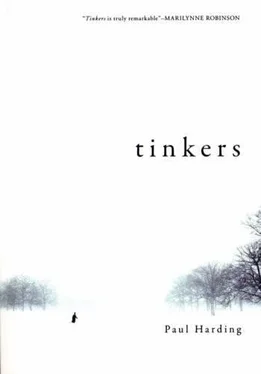Gilbert was a graduate of Bowdoin College. According to the stories, he had liked to boast that he had been a classmate of Nathaniel Hawthorne's. Although he would have to be nearly 120 years old for the rumor to be true, no one cared to refute the claim, because they found too delightful an image to dispel the notion that the local hermit, dressed in animal skins, muttering litanies (as often as not in Latin), and, in warmer seasons, attended by a small but avid swarm of flies, which constantly buzzed around his head, crawled over his nose, and sipped the tears from the corners of his eyes, had once been a clean-faced, well-ironed acquaintance of the author of The Scarlet Letter. Gilbert was apparently not his real name and no one really knew when he had been born so the people left it at that.
People liked to speculate and tell stories about Gilbert the Hermit, especially when they sat around their woodstoves on winter nights with a blizzard howling outside; the thought of him out there in the maelstrom gave them a comforting thrill.
Howard supplied Gilbert. Gilbert's needs from the world of men were few, but he did require needles and thread, twine, and tobacco. Once a year, on the first day that the ice went out of the ponds, sometime in May, Howard rode his wagon to the Camp Comfort Club hunting cabin, itself remote, and from there toted on his back the supplies he knew Gilbert required down an old Indian trail that followed the river. Somewhere along the way, Howard would meet Gilbert. The men would greet one another with nods of their heads. They struggled through the bushes down to the river's edge, Howard with his bundle, Gilbert with his court of flies and a buckskin bag. There they would each find a rock or a dry tuft of grass to sit on. Howard took a tin of tobacco from the bundle of supplies he had brought for Gilbert and handed it to the hermit. Gilbert held the open tin to his nose and inhaled slowly, savoring the rich, sweet near dampness of the new tobacco; by the time he met Howard each year, he was down to the last flakes of his supply. Howard imagined that the fragrance of new tobacco was a sort of confirmation to Gilbert that he had indeed lived another year, endured another winter in the woods. After smelling the tobacco and looking out at the river for a moment, Gilbert held out his hand to Howard. Howard took a pipe from one of his jacket pockets and gave it to the hermit. Howard did not otherwise smoke and kept the pipe for this one bowlful a year. Gilbert packed Howard's pipe and then his own (which was beautiful-carved from a burl of dark red wood and which Howard imagined belonging once, long ago, in a brass stand on a dean's desk) and the two men smoked together in silence and watched the waters rush. While he smoked, Gilbert's flock of flies temporarily dispersed, but seemingly without rancor or resentment. When the pipes were spent, each man tapped the ashes out against his rock and put his pipe away. The flies settled back in their orbit around the hermit's head (Circum capit, he muttered) and he opened his buckskin bag and produced two crude wooden carvings, one which seemed to be a moose, the other a beaver, or perhaps a woodchuck, or even a groundhog. The work was so poor that Howard could only say for sure that the little raw wooden lumps that the hermit placed in the winter-dead grass between them were supposed to be animals of some kind. Next to the carvings, Gilbert then lay a beautifully skinned fox fur, head included, that smelled like rotting meat. There was a moment of panic for the flies as they decided which was more rancid, the hermit or the skin. In the end, they were loyal to their more pungent, living host. Howard placed the bundle of supplies on the grass and each man collected his goods. The men had exchanged few words during the first few years of this spring ritual and these only to refine the order of Gilbert's supplies. One year he said, More needles. Another year he said, No more tea-coffee now. Once the list had been refined and finally established, the men no longer spoke at all. For the past seven years, neither man had uttered a single word to the other.
The last year Howard met Gilbert in the woods, though, the men spoke. When he came upon the hermit, he saw that the man's left cheek was as swollen and as shiny as a ripe apple. Gilbert shuffled his feet and stared at the ground and held his hand against the cheek. Even the flies were solicitous of their sponsor's pain and seemed to buzz more gingerly about him. Howard cocked his head in a silent question.
Gilbert whispered, Tooth.
Howard could not imagine that this old husk of a man, this recluse who seemed not much more than a sour hank of hair and rags, had a tooth left in his head to ache. Nevertheless, it was true. Stepping closer, Gilbert opened his mouth and Howard, squinting to get a good look, saw in that dank, ruined purple cavern, stuck way in the back of an otherwise-empty levy of gums, a single black tooth planted in a swollen and bright red throne of flesh. A breeze caught the hermit's breath and Howard gasped and saw visions of slaughterhouses and dead pets under porches.
Tooth, the hermit said again, and pointed into his mouth.
Oh, yes, awful thing, Howard said, and smiled in sympathy.
The hermit said, No! Tooth! and continued pointing. Howard realized that the poor afflicted man wanted him to take the tooth out.
Oh, no, no! he said. I have no idea-
Gilbert cut him off. No! Tooth! he squeaked, an octave higher than before.
But I haven't any- Again the hermit cut him off, shooing him back toward where his wagon stood, three miles away at the Comfort Camp Club cabin.
Howard returned two and a half hours later with a small flask of corn whiskey from Potts's mountainside still and a pair of long-handled pliers he used when he had to solder small pieces of tin to leaky pots. At first, Gilbert refused any liquor, but when Howard grabbed the tooth with the pliers, the old man passed out. Howard dashed a handful of cold river water on Gilbert's face. The hermit came to and motioned for the whiskey, which he drank in a single draft, then passed out again from the alcohol on the bedeviled tooth. Another splash of water revived Gilbert, and the two men sat for a time watching a pair of sparrows chase a crow above the fir trees on the other side of the river.
The river was high after an early, fast melt, and loud. Voices seemed to mingle in the water, as if there were a race of men who dwelled among the rapids. When Gilbert began to list and recite Virgil, Uere nouo, gelidus canis cum montibus humor liquitur Howard reached into the hermit's mouth with the pliers, grabbed the fetid tooth, and pulled with all of his strength. The tooth did not budge. Howard let go. Gilbert looked baffled for a moment and then passed out again, flat on his back, the flies neatly following him from upright to laid out. Howard was convinced at first that his customer was dead, but a damp whistle from the hermit's fly-rimmed nose indicated that he could still be counted among the relatively quick.
The old man's mouth hung wide open. Howard straddled his shoulders and grabbed the tooth with the pliers. When he finally succeeded in excavating the tooth, Gilbert's face and beard were covered in blood. Another splash of river water revived the patient. When he saw Howard standing before him with the gory pliers in one hand and a tooth extraordinarily long of root in the other, Gilbert fainted.
Two weeks later, Buddy the Dog's barking wakened Howard. He rose from bed and went to the kitchen door to see if there was a bear or stray cow in the yard. Placed on the doorstep was a package wrapped in greasy, foul-smelling leather and tied with twine which Howard recognized as the type he sold. Standing in the moonlight, he untied the twine and unfolded the leather. Beneath the leather was a layer of red velvet. Howard opened the velvet and there, looking as new as the day it was printed, the pages uncut, was a copy of The Scarlet Letter. Howard opened the book. Inscribed on the title page were the words To "Hick" Gilbert: Here is to the shared memories of young men in the prime of their journeys. Yours always in faith and brotherly friendship, Nath'l Hawthorne, 1852.
Читать дальше












